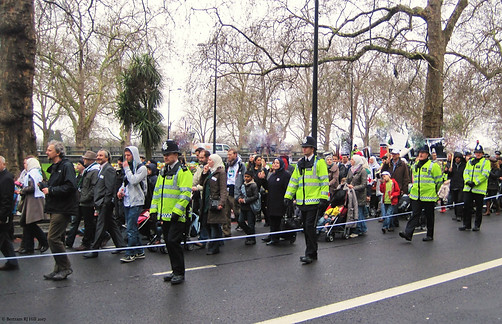talk till morning
For the Love of Ideas
democracy will roar
I claim myself to be part of the egalitarian generation. Those whom advocate agencies of compassion and progression towards a more equal existence, with the freedom to act off our own decision alone.
Agencies of this egalitarian nature have largely succeeded, at least superficially, in penetrating the public realms of the modern West. It is relatively rare to find individuals preaching hate of a group based on their demographic properties alone. At least, rarely in a way that reveals the preaching individual’s identity; such is the infiltration of such egalitarian principles. But it is precisely this generation’s rise that has incepted a new obstacle to the compassionate, progressive world we chase.
Discussion and debate have never been more accessible, yet we find ourselves increasingly muzzled in their usage
Protestors march against the xenophobia they have experienced.
University spaces, like student seminar rooms, set the scene for a multiplicity of undeveloped, differing opinions to cocktail together in an effervescent explosion of colour and vigour; often leaving a sour, disorientating taste. From such concoctions, information can be collected, and standpoints drawn. Whatever the outcome, these rooms act as grassroots from which many political viewpoints stem.
As with any flower, their direction of growth will depend on where they deem the strongest source of light to originate. Their definition of an enlightened view will differ to others. But the egalitarian generation has developed its own selection of enlightened views. Now, to speak in favour of differing ethnicity, gender or sexuality, has become moralised to the point of sainthood. To speak out against the liberal values that underpin the modern West has become taboo. It is here where the victory of the egalitarian generation has become a simultaneous defeat.
Those who speak out against commonplace egalitarian principles have become the ‘others’ who, unlike us, are endangering our already fragile world. Those who silence and resist them are the ‘selves’ who, like us, are trying to save it. The answer seems so simple. To halt their ostracising, those who ostracise must be ostracised. Is the action of identifying and stigmatising those who speak out against egalitarian perspectives, one that can prevent their ‘damaging’ voices being heard?
To answer this question, I ask you this: Does a caged lion conform to its keepers wishes once outside the cage? No. Its roars with twice the original ferocity. Its acts with twice the unstoppable resolve.
Paradoxically, it is our historic victory in transferring power from the clutches of monarchy to the quivering hands of the masses that forces the keepers to open the cage. Perhaps on an everyday basis, individuals expressing opinions subverting egalitarian principles will be silenced and shunned in the name of progressive modernity. But our victory in democratic empowerment unveils this silencing as a critical form of defeat. Though the lion’s de-moralised views become muted in public spaces, in the voting booths his democratic roar will be all the stronger.
Alienation of those who disagree with common public opinion is the not the answer to our troubles. To fight for democracy’s effectiveness, we must achieve three goals. Firstly, we all must cease our hushing of that which contravenes, and instead urge it from the lips of those we would disrepute. We must hear the offensive, angering and ‘irrational’ views that would push us from our own logical outlooks, and be steadfast in not buttressing our standpoints with emotion alone. And thirdly, after considering such controversial viewpoints, we must propose alternative ones to the speaker. Being careful to base our criticisms on dialectical reasoning, ahead of sentimental frustration.

Indeed, this is an approach effective only with those ‘others’ whom are willing to consider their alternative. If their reasoning is based on blind emotion alone, it makes the job all the tougher as, by definition, there is no such thing as an incorrect opinion. But it is by no means impossible. Emotion can be stubborn but there are forces that can manipulate it.
One such force is those precious few ‘selves’ whom are blessed in the arts of persuasion. Yet they have to be more than blessed. You will find the job of a demagogue ‘convincing’ commonly silenced groups of their own controversy, far easier than that of a fair and reasoned argument advocating the opposite. The survival of these controversial circumstances, despite the common de-moralisation against them, reveals their tenacious nature. It is a difficult task the ‘selves’ face, but the first hurdle to cross is that of dichotomy.
Those who strive for a liberal, progressive and compassionate modernity cannot achieve this by slapping a title of 'EVIL' on the foreheads of the ‘others’. There are not ‘selves’ or ‘others’. There are those who disagree with certain opinions, and those who do not.
But what’s wonderful about this new obstacle to my egalitarian generation’s dream, is that it can be overcome. Opinions are changeable, but only if one has the open mind to hear, the guile to remain calm, and the tact to convince the speaker of the opposite. Where do we first hear? In university seminar rooms, and it is at these grass roots where we must strive to alienate alienation, even if those around us may not.
Shouting the word for all to hear
